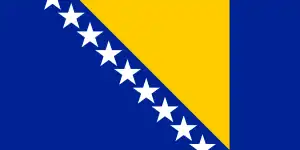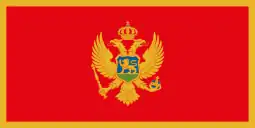| |||||||||||||||||||||
| |||||||||||||||||||||
| |||||||||||||||||||||
|
The Serbo-Croatian standard languages (Serbian, Croatian, Bosnian and Montenegrin) have one of the more elaborate kinship (srodstvo) systems among European languages. Terminology may differ from place to place. Most words are common to other Slavic languages, though some derive from Turkish. The standardized languages may recognize slightly different pronunciations or dialectical forms; all terms are considered standard in all language standards, unless otherwise marked: [S] (Serbian), [C] (Croatian), [B] (Bosnian) and [M] (Montenegrin) below.
There are four main types of kinship in the family: biological a.k.a. blood kinship, kinship by law (in-laws), spiritual kinship (such as godparents), and legal kinship through adoption and remarriage.[1]
As is common in many rural family structures, three generations of a family will live together in a home in what anthropologists call a joint family structure, where parents, their son(s), and grandchildren would cohabit in a family home.[2]
Direct descendance and ancestry
Words for relations up to five generations removed—great-great-grandparents and great-great-grandchildren—are in common use. The fourth-generation terms are also used as generics for ancestors and descendants. There is no distinction between the maternal and paternal line.
| Latin | Cyrillic | Relation |
|---|---|---|
| čukununuka šukununuka [C] | чукунунука шукунунука [C] | great-great-granddaughter |
| čukununuk šukununuk [C] | чукунунук шукунунук [C] | great-great-grandson |
| praunuka | праунука | great-granddaughter, descendant |
| praunuk | праунук | great-grandson, descendant |
| unuka | унука | granddaughter |
| unuk | унук | grandson |
| kćer kćerka ćerka kći | кћер кћерка ћерка кћи | daughter |
| sin | син | son |
| majka mater mati | мајка матер мати | mother |
| mama keva | мама кева | mom |
| otac | отац | father |
| babo [B] ćaća [C] ćale [S] tajo [M] tata | бабо [B] ћаћа [C] ћале [S] тајо [M] тата | dad |
| baba baka nana [B] nona | баба бака нана [B] нона | grandmother |
| ded(a) deka [S] did(a) [C] dido djed đed [M] nono [C] dedo [B] | дед(a) дека [S] дид(a) [C] дидо дјед ђед [M] ноно [C] дедо [B] | grandfather |
| prababa prabaka | прабаба прабака | great-grandmother, ancestor |
| praded(a) pradid(a) [C] pradido pradjed prađed [M] | прадед(a) прадид(a) [C] прадидо прадјед прађед [M] | great-grandfather, ancestor |
| čukunbaba šukunbaka [C] | чукунбаба шукунбака [C] | great-great-grandmother |
| čukunded(a) čukundjed čukunđed [M] šukundid(a) [C] šukundjed [C] | чукундед(a) чукундјед чукунђед [M] шукундид(a) [C] шукундјед [C] | great-great-grandfather[3] |
| predakinja [S] pretkinja [C] pređa [M] | предакиња [S] преткиња [C] пређа [M] | female ancestor |
| predak | предак | male ancestor |
Own generation
Diminutive forms of siblings are used for cousins.
| Latin | Cyrillic | English translation |
|---|---|---|
| brat | брат | brother |
| sestra | сестра | sister |
| bratić [C] | братић [C] | male first cousin |
| sestrična [C] | сестрична [C] | female first cousin |
| brat od strica stričević amidžić | брат од стрица стричевић амиџић | male cousin (always first or second), son of father's brother (or male first cousin) |
| brat od daja brat od ujaka daidžić ujčević | брат од даја брат од ујака даиџић ујчевић | male cousin (always first or second), son of mother's brother (or male first cousin) |
| brat od hale brat od tetke tetić tetkić tetišnji | брат од хале брат од тетке тетић теткић тетишњи | male cousin (always first or second), son of mother's or father's sister (or female first cousin) |
| sestra od strica stričevka admidžišnja | сестра од стрица стричевићка амиџишња | female cousin (always first or second), daughter of father's brother (or male first cousin) |
| sestra od daja sestra od ujaka ujčevka daidžišnja | сестра од даја сестра од ујака даиџишња ујчевићка | female cousin (always first or second), daughter of mother's brother (or male first cousin) |
| sestra od hale sestra od tetke tetišnja | сестра од хале сестра од тетке тетишња | female cousin (always first or second), daughter of mother's or father's sister (or female first cousin) |
| rođak | рођак | male cousin, relative |
| rođaka [S] rođakinja rodica [C] | рођака [S] рођакиња родица [C] | female cousin, relative |
Indirect ancestry, descendants and legal relations
There are separate terms for maternal and paternal uncles, but not for aunts. In addition, spouses of uncles and aunts have their own terms.
| Latin | Cyrillic | Relation |
|---|---|---|
| amidža adžo stric čiča čika ćić | амиџа аџо стриц чича чика ћић | paternal uncle |
| amidžinica adžinica strina | амиџиница аџиница стрина | paternal uncle's wife |
| daidža / dajdža dajo ujak | даиџа / дајџа дајо ујак | maternal uncle |
| daidžinica / dajdžinica dajnica ujna | даиџиница / дајџиница дајница ујна | maternal uncle's wife; i.e. maternal aunt through marriage |
| hala tetka | хала тетка | aunt (only mother's or father's sister or cousin) |
| teča [S] tetak | теча [S] тетак | aunt's husband (where aunt defined as "tetka") |
| bratanac | братанац | fraternal nephew (for women[S], for men and women[C]) |
| bratanić bratić | братанић братић | fraternal nephew (for men and women) |
| sinovac | синовац | fraternal nephew (for men[S]) |
| bratanica brataničina bratičina | братаница братаничина братичина | fraternal niece |
| nećak | нећак | nephew |
| nećaka nećakinja | нећака нећакиња | niece |
| sestrić | сестрић | sororal nephew |
| sestričina | сестричина | sororal niece |
In-laws
There are separate terms for a man's and a woman's parents-in-law. However, the same terms are commonly used for siblings-in-law and children-in-law. There are separate terms for co-siblings-in-law.
| Latin | Cyrillic | Relation | English translation |
|---|---|---|---|
| svekar | свекар | husband's father | father-in-law |
| svekrva | свекрва | husband's mother | mother-in-law |
| punac [C] tast[S] | пунац [C] таст [S] | wife's father | father-in-law |
| punica [C] tašta[S] | пуница [C] ташта [S] | wife's mother | mother-in-law |
| zet | зет | daughter's or sister's husband | son-in-law or brother-in-law |
| nev(j)esta odiva [M] snaha snaja [C, S] | нев(ј)еста одива [M] снаха снаjа [C, S] | son's or brother's wife | daughter-in-law or sister-in-law |
| šura(k) šurjak[C] šogor[C] | шура(к) шурjак [C] шогор [C] | wife's brother | brother-in-law |
| šurjakinja[C] šurnjaja | шурјакиња[C] шурњаја | wife's brother's wife | sister-in-law |
| svastika šogorica [C] | свастика шогорица [C] | wife's sister | sister-in-law |
| svastić | свастић | wife's sister's son | nephew-in-law |
| svastičina | свастичина | wife's sister's daughter | niece-in-law |
| badženjak badžo d(j)ever đever [M] | баџењак баџо д(j)евер ђевер [M] | husband's brother | brother-in-law |
| jetrva | јетрва | husband's brother's wife | co-sister-in-law |
| zaova | заова | husband's sister | sister-in-law |
| zaovac | заовац | husband's sister's husband | co-brother-in-law |
| pašanac pašenog badžo | пашанац пашеног баџо | wife's sister's husband | co-brother-in-law |
| prija | прија | child's spouse's mother | co-mother-in-law |
| prijatelj | пријатељ | child's spouse's father | co-father-in-law; N.B. the exactly same word means "friend" (general word) |
Step-relatives
There are spouses of ancestors that are not blood relatives and their spouse's descendants, second spouse of father's or mother's siblings (paternal or maternal step-aunts and step-uncles) and their children.
| Latin | Cyrillic | Relation |
|---|---|---|
| očuh | очух | stepfather |
| maćeha | маћеха | stepmother |
| pastorak | пасторак | stepson |
| pastorka pastorkinja | пасторка пасторкиња | stepdaughter |
| polubrat | полубрат | half-brother (through only one parent) |
| – brat po ocu | брат по оцу | half-brother (sharing same father, different mothers) |
| – brat po majci | брат по мајци | half-brother (sharing same mother, different fathers) |
| polusestra | полусестра | half-sister (through only one parent) |
| – sestra po ocu | сестра по оцу | half-sister (sharing same father, different mothers) |
| – sestra po majci | сестра по мајци | half-sister (sharing same mother, different fathers) |
Foster-relatives
Foster relations are important and have dedicated terms.
| Latin | Cyrillic | Relation |
|---|---|---|
| usvojenik | усвојеник | adopted son |
| usvojenica | усвојеница | adopted daughter |
| poočim | поочим | foster-father |
| pomajka | помајка | foster-mother |
| posinak usinjenik [S] | посинак усињеник [S] | foster-son |
| po(k)ćerka | по(к)ћерка | foster-daughter |
References
- ↑ "Obitelj, Brak, Srodstvo | PDF". Scribd. Retrieved 2023-01-01.
- ↑ Schweizer, Thomas; White, Douglas; White, Douglas R.; Granovetter, Mark (1998-06-13). Kinship, Networks, and Exchange. Cambridge University Press. ISBN 978-0-521-59021-1.
- ↑
- (in English)Svetozar Brkić, Živojin Simić (1993) English–Serbian and Serbian–English dictionary
Further reading
- Mrđa, Željka (2 Oct 2017). "SURDEPAČ, PARĐPAČ, OŽMIKUR Ovo su srpske reči, a da li znate šta ZNAČE?". Blic. Archived from the original on 5 Oct 2017. Retrieved 29 June 2022.
- Мирко Бaрјaктaровић (1986). Никола Пантелић (ed.). "О сродничким називима код нас и њиховом делимичном нестајању". Гласник Етнографског музеја у Београду књ. 50. Etnografski muzej u Beogradu: 159–171. GGKEY:1Y5P116PDB9.



